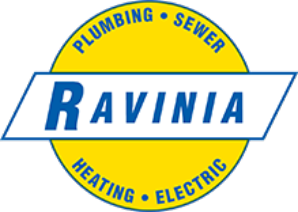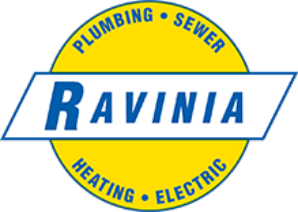
When the bitter cold hits the Chicago area, it can cause more than just comfort issues for you and your family. Freezing temperatures can also cause your plumbing pipes to freeze and burst – leading to a messy situation that can cause hundreds, or even thousands, of dollars worth of damage. Pipes most at risk are those in unheated spaces like basements, crawlspaces, attics, garages, and those exposed to exterior walls.
Fortunately, there are things you can do to prevent pipes from freezing and bursting. Keep an eye on the weather and watch out for freezing temperatures during the cold weather season. The licensed plumbers at Ravinia Plumbing, Sewer, Heating & Electric offer some tips to consider whenever the temperatures drop to 20 degrees Fahrenheit or colder.
Tips to Keep Your Pipes from Freezing
Here are some tips to prevent frozen pipes:
- Keep your garage door closed at all times (you should be doing this anyway for security reasons) to prevent cold air from entering it. Garage walls are often not as insulated as well as outside walls, allowing cold air to seep into the house.
- Open kitchen and bathroom cabinet doors so the warm air from the house can circulate around the pipes behind the cabinets, especially those near exterior walls. Pay special attention to cabinet doors below the faucets inside the home. Opening these doors allows more household heat to circulate around those pipes.
- Let cold water trickle from faucets near exposed pipes. Yes, it can add to your water bill, but it’s a small price to pay to prevent water pipes from freezing and bursting.
- Control the temperature in your home. Even if you are away, your thermostat should be set to a minimum of 55 degrees, safeguarding your home from becoming too cold.
- Insulate water pipes. Purchase an insulation kit at your local hardware store. The easiest and most common way to make sure your pipes are properly insulated is to install tubular foam that is slit lengthwise to slip over existing pipes. You can use this type of insulation on both metal and plastic pipes.
- Insulate unheated areas. Longer term, insulating unheated areas, such as basements, attics and crawl spaces, can help to limit the amount of cold air coming in (and warm air coming in in the summer).
- Inspect outside water lines. Empty and disconnect outside hoses, drain your pool and install covers on all outside faucets.
Expert Tips on Dealing with Frozen Pipes
If your pipes are already frozen (which you can notice if only a trickle of water is coming out of faucets and fixtures), there are a few things you can do to thaw frozen pipes to prevent them from bursting.
- Know where the main water shutoff is located for the home. If the pipe you are thawing bursts, you will need to turn off the water quickly to minimize water damage.
Determine which pipe or pipes are frozen. This can be done by observing frost on exposed frozen pipes or locating the pipe based on which faucets aren’t working. - Keep the faucet on. As you begin to treat the frozen pipes, make sure the faucet stays on. As the frozen area inside the pipe starts to melt, water will begin to flow again through the frozen area, which will help melt the ice.
- Apply heat to the frozen pipe section. Using an electric heating pad, a hair dryer, or a portable space heater, begin to warm the section of the frozen pipe. Towels soaked in hot water, and wrapped around the pipe, can also help the thawing process. Apply heat to the frozen section by wrapping an electric heating pad around it, blowing it with a hair dryer, or wrapping it with towels soaked in hot water. Never use an open flame when thawing out frozen pipes.
- Enclosed frozen pipes require different thawing measures. Raising the heat in the house may be enough to melt the ice blockage in the pipe. If you know where the pipe is located within the wall, using an infrared lamp can create enough heat to help the pipe defrost. A more drastic measure is cutting out a section of the drywall if you are sure of the location of the frozen pipe. If the pipes do not thaw out after using this heating process for a while, it may be time to call a professional plumber.
Frozen pipes do not necessarily have to lead to bursting pipes if you’re able to treat the pipes quickly. Using these tips, you can have running water back in no time, even in the harsh Chicagoland winters.
Contact Ravinia Plumbing for Plumbing Services
In the unfortunate circumstance that you experience a burst pipe, the licensed plumbers at Ravinia Plumbing can install new piping. We can also install an automatic water shutoff valve that will automatically turn off your home’s water supply if it detects any irregularities in the water flow. This will protect your home from burst pipes and the damage caused by them. Contact us today to schedule an appointment.



